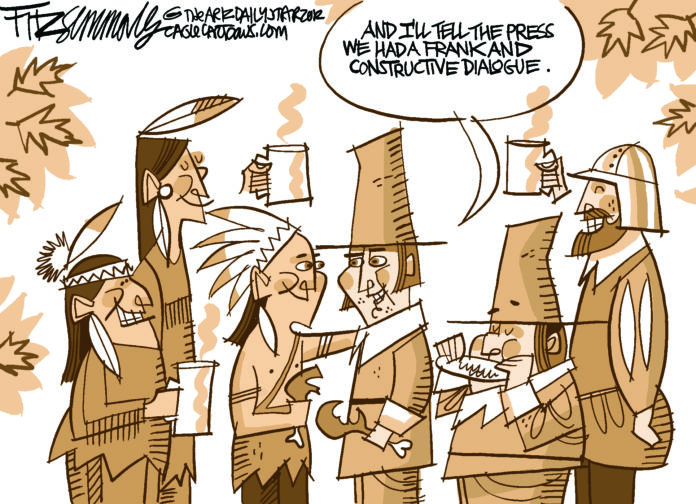BY DON NELSON
When history is viewed in the rearview mirror it often looks distorted or even false. As I reflect on the plans that are being made for my family’s Thanksgiving feast I am irresistibly drawn back to a very much different place and time.
It is a time when the clash of two very different cultures was just taking shape. For sick and dying Europeans that were most certainly going to perish, the encountering of a frighteningly different visage of humanity, or what appeared to be, was both welcomed and feared.
For the indigenous people of the eastern part of the continent, the encounter was not their first with these oddly over-dressed and seemingly anti-social light skinned humans. For 100 years they had been the object of European slave hunters and would remain so after the romanticized meal of thanks.
It all depends on whether you want to be honest or whether you chose to live in some sort of Disney-created version of the Pilgrims and Indians and the food they shared.
The honest version is that when the Pilgrims came to Plymouth Rock, they were poor and hungry – half of them died within a few months from disease and hunger.
When Squanto, a Wampanoag man, found them, they were in a pitiful state. He spoke English, having traveled to Europe, and took pity on them. Their English crops had failed. The native people fed them through the winter and taught them how to grow their food.
These were not merely “friendly Indians.” They had already experienced European slave traders raiding their villages for 100 years or so, and they were wary – but it was their way to give freely to those who had nothing.
Among many Native peoples, showing that you can give without holding back is the way to earn respect.
How did the European immigrants treat their hosts? The first Thanksgiving was not in 1621, the meal shared by indigenous people and the Pilgrims. Although it is the image most commonly associated with the holiday, a much prettier picture to remember.
Rather, the first Thanksgiving was declared by the governor of the Massachusetts Colony, William Bradford, in 1637. It was not a celebration of kinship between the Europeans and the indigenous people; it was a celebration of the Pequot massacre.
In his declaration, Gov. Bradford wrote that the celebration was to be “a day of celebration and thanksgiving for subduing the Pequot.” The subduing was the murder of 700 people of all ages and genders.
Bradford died in 1657.
The native people that initially came to the rescue of the white immigrants were the Wampanoag people. In a very real way it can be said that they are the reason that the first of the Europeans survived.
The Wampanoag leader was called Massasoit. Massasoit died around 1660 and was succeeded by his son Wamsutta.
With the passing of the first generation, the personal bonds which had maintained peace between the two very different groups were broken.
Tensions had long existed due to the two cultures’ different ways of life. Colonists’ livestock trampling native cornfields was a continuing problem. Competition for resources created friction. Regional economic changes forced many natives to sell their land.
In 1662, in an arrogant attempt to exert control, colonial forces took Wampanoag leader Wamsutta at gunpoint to Plymouth. The Wampanoag were greatly angered when Wamsutta sickened and died shortly afterwards.
Wamsutta’s brother Metacomet [King Philip] became leader and ultimately led his people into war to preserve their traditional way of life. The conflict came to be known as “King Philip’s War.”
That accounting comes from history as written by a European. What follows is history written by a Native American.
In 1675-76, to show “gratitude” for what Massasoit’s people had done for their fathers and grandfathers, the Pilgrims manufactured an incident as a pretext to justify disarming the Wampanoags.
The whites went after the Wampanoag with guns, swords, cannons, and torches. Most, including Metacomet, were butchered. His wife and son were sold into slavery in the West Indies. His body was hideously drawn and quartered.
For 25 years afterward Metacomet’s skull was displayed on a pike above the whites’ village. The real legacy of the Pilgrim fathers is treachery. Same reality – different perspective.
History is replete with examples of being cleaned up and sanitized, re-constructed so that those yet born will not have an accurate accounting but one that all can feel good abou
Well, not all – for certainly there were two cultures involved. One that was on the cusp of being obliterated by the other, which was bent on the conquering of what they saw as a “New World.” Kinda like a car taken from its owner that becomes a “new car” for the second owner.
I do not mean to dampen the communal celebration of family. There is much to be grateful for.
I think it is time to be honest and understand that the prosperity we celebrate came at the expense of a kind and generous people.
Be grateful for what is yours, today.
Be thankful that a people called Wampanoag made it possible.
Be kind, generous and gentle to all you meet, and remember that it was in that spirit that the first Americans greeted those that would be their greatest threat.
– Don Nelson lives in Lawton, OK and is an occasional contributor to The Oklahoma Observer








